Prioritizing the Health and Wellness of Essential Bay Area Farmworkers
Selina Knowles, Communications Coordinator
September 30, 2022
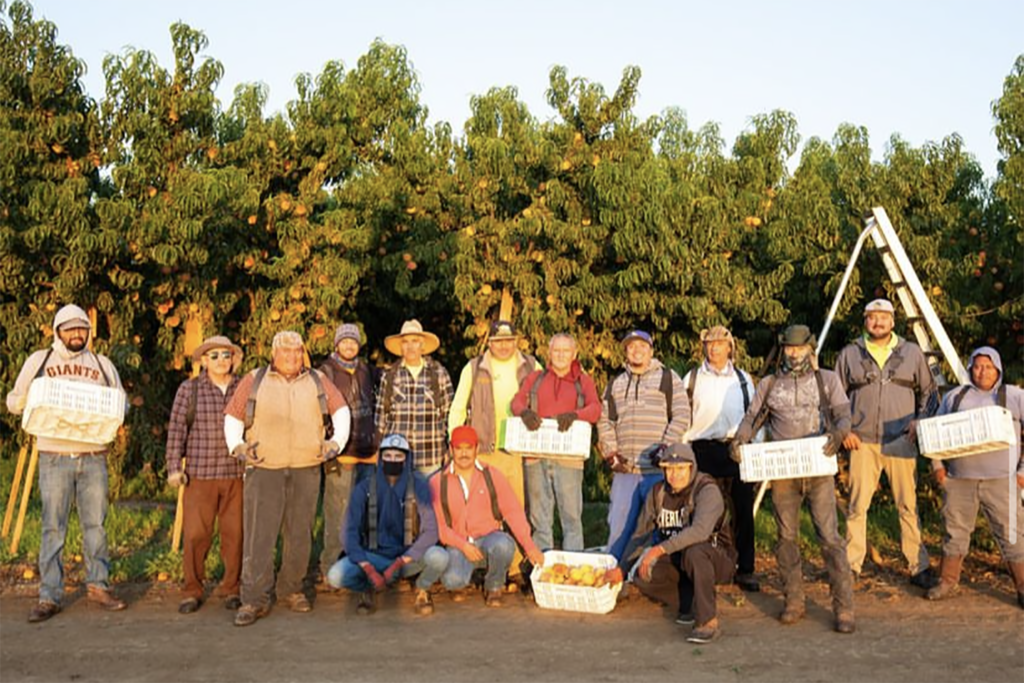
Latino communities are the lifeblood of US agriculture, yet Latino workers across all industries experience health disparities combined with a historical lack of access to preventative care. On Frog Hollow Farm, Farmer Al Courchesne and healthcare interpreter and wellness trainer Elena Velez are working together to prioritize the physical and mental health of agricultural workers.
On the 40-year-old regenerative organic farm in Brentwood, field and packing workers participate in a Community Restorative Training program. In weekly discussions led in Spanish, they address job-specific stressors and practice tools to support their physical and mental health.
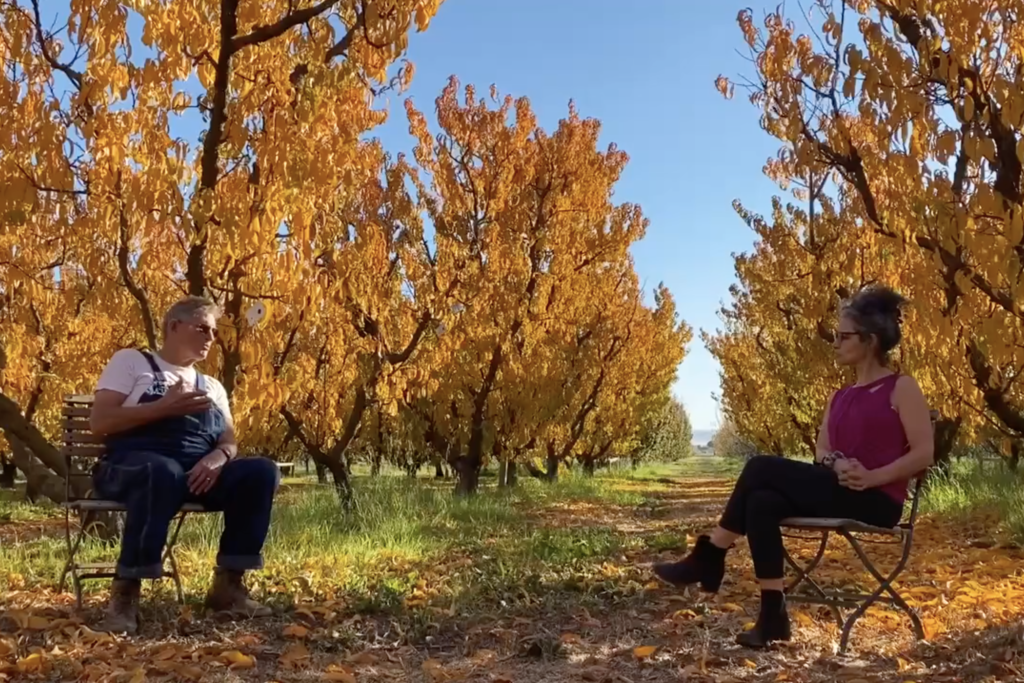
Cultivating Environmental and Social Sustainability
Farmer Al, as he prefers to be called, grew up in the Bay Area and graduated from UC Berkeley with a degree in anthropology before starting Frog Hollow Farm in 1976. Since then, Farmer Al, his wife, Rebecca, co-owner Sarah Coddington, and the farm’s 50+ workers have grown the farm into a 253-acre operation specializing in organic fruit.
Frog Hollow Farm takes pride in cultivating a sustainable work environment that puts workers first, offering family housing and year-round employment. “The ecology has to do with not just the soil, but the people who care for the soil,” says Farmer Al. “They’re a part of our community. We rely on their loyalty, and we rely on their health.”
Over 10 years ago, Elena visited Frog Hollow Farm and met Farmer Al for the first time. He recalls, “We realized that we had a connection with our concern for farmworkers and their health.” With 18 years of experience as a Certified Healthcare Interpreter, Elena witnesses firsthand the trials of Latinx workers across all industries.
She says, “Their plate is more than full with stress, lack of time, lack of medical insurance, and lack of language access. There’s just work, work, work.” Agricultural workers across the country are vulnerable to higher than average rates of depression and anxiety, as well as high injury rates. The stress of their physically demanding jobs was further impacted by their high risk of COVID-19 exposure, with positive test rates four times as high compared to city dwellers.
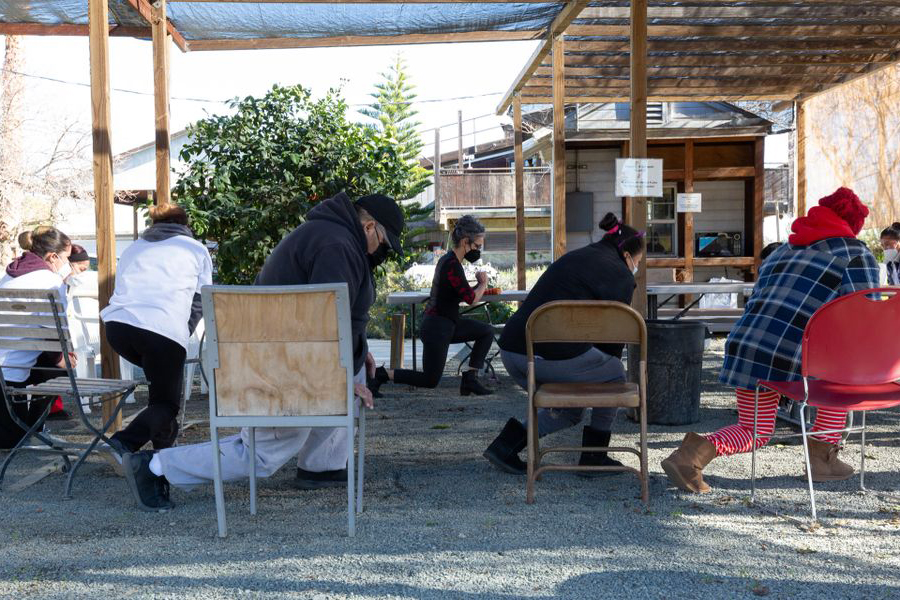
Addressing Education and Language Disparities
In response to the increased stress and risks that workers faced during the pandemic, Elena approached Farmer Al with a proposal to pilot holistic health and restoration classes called “Talleres Restaurativos Comunitarios” (“Community Restorative Training”). In 2020, they introduced the program on the farm, and it continues to positively impact the workers’ physical and mental wellbeing.
Each of us have varying levels of health literacy, which is described as “the ability to obtain, process, and understand basic health information and services to make appropriate health decisions.” For many farmworkers in California, language barriers and education levels can negatively impact health literacy.
Through Community Restorative Training, Elena is working to expand Spanish speakers’ access to health information. During weekly training sessions on the farm, Elena leads culturally appropriate conversations in Spanish on health topics like sleep and exercise, and shares wellness practices for daily life like meditation and stretching techniques.
“The reason I do it in Spanish is because the advantage to any other community is shared language, which is something basic.” In California, 92% of farmworkers are Spanish speakers, and 44 percent report they don’t speak English.
Farmer Al agrees, “A big challenge for farmworkers is that they live in a community that is English speaking, and they’re Spanish speaking. So, there are a lot of resources that they don’t have access to just because of the language barrier.”
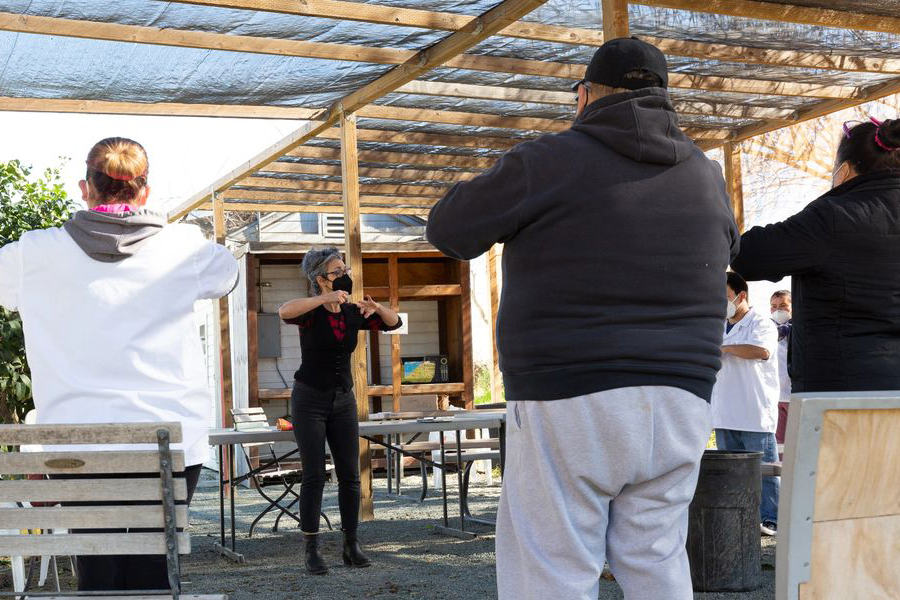
Practicing Community Building on the Farm
At the start of the trainings, Elena encountered some hesitation from Frog Hollow Farm’s workers, which required building relationships with the team. She says that generally women were resistant to advice on how to manage family stress, and men were wary of seeking help and appearing weak.
“For the whole farm, it was a matter of time to build that trust,” she says. “I am just like them. I am a mother of two, I have to deal with my kids on my own, I have a lot of stress.” Being open about her own experiences, she worked on finding common ground and building a foundation of trust.
Understanding time constraints and financial constraints, Elena advocates for practices that individuals are able to realistically bring into their everyday lives, with no cost. She also believes that workers should be allotted time during their work day for these practices, knowing that time can be a scarce resource.
Gradually, the community at Frog Hollow Farm warmed up to her and their sessions together. “Now, they see me,” says Elena, “They see that I care for them and value their work.” Now, they even practice her techniques at home and with their families.
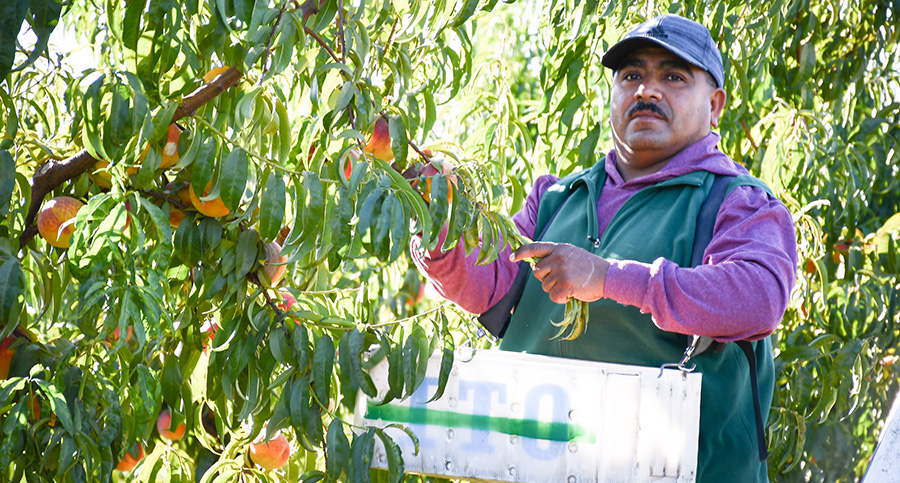
Investing in Farmworkers’ Health
Upon meeting Elena, Lucy, a worker at Frog Hollow Farm, confessed that she had never been able to meditate. Meditation and breathing techniques are among the tools that Elena teaches for managing stress. With some open-mindedness and practice, Lucy was proud to report that she was able to reap the benefits of meditation.
Luis, another worker at Frog Hollow Farm, also expressed gratitude to Elena, “Gracias por ayudarnos a mejorar nuestra vida diaria física y mentalmente. Yo creo que todos podemos tener una mejor vida física y mental solo falta motivación, ganas de hacerlo, constancia y disciplina.” (“Thank you for helping us improve our daily lives physically and mentally. I believe that we can all have a better physical and mental life, we just need the motivation, perseverance, and discipline to do it.”)
By investing in employee health and wellness, Farmer Al is also investing in a farm operation that will be sustainable in the long term. “I’d say this has definitely created a more positive attitude towards being part of the Frog Hollow Farm community,” Farmer Al says. “I notice an improvement in the esprit de corps, the enthusiasm with which the workers come to work. They know that they’re supported.”
Elena encourages us to recognize the role of Latino, Latina, and Latinx essential workers and invest in their wellbeing without waiting for the next health crisis. “We don’t need to wait for people to die to recognize them: ‘Hey, without you, we couldn’t eat, we couldn’t take care of our grandparents or parents, we couldn’t clean the hotels and houses or care for gardens.’ Without the Latinx community, we cannot be who we are.”
Find Frog Hollow Farm at the Ferry Plaza Farmers Market on Saturdays, and learn more about Elena Velez and Community Restorative Training here.
Topics: Food justice, Health, Labor
